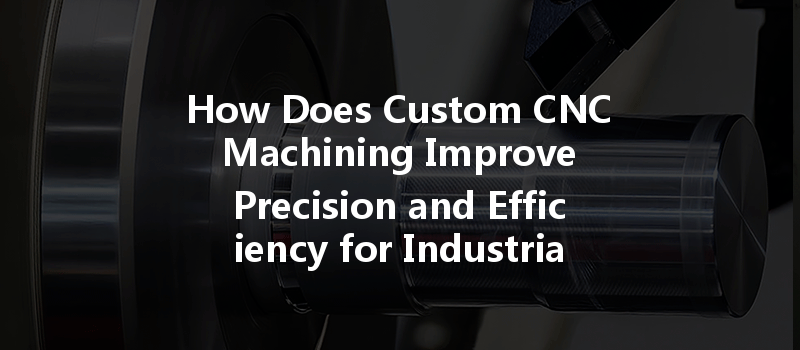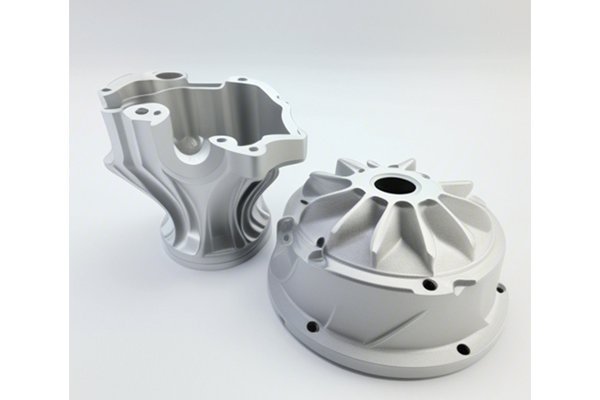Did you know that nearly 70% of manufacturers believe that custom CNC machining significantly enhances their manufacturing capabilities? This statistic isn’t just a number; it reflects a growing trend where businesses are increasingly relying on precision engineering to meet their production demands. If you’ve ever grappled with the intricacies of industrial manufacturing, the term “custom CNC machining” may sound familiar. But what does it mean? Why is it becoming indispensable for modern industries? Let’s dive into the world of custom CNC machining and uncover how it improves both precision and efficiency for industrial parts.
Computer Numerical Control (CNC) machining is a process that utilizes programmed commands to control the movement of production equipment. With the help of CAD (Computer-Aided Design) software, CNC machines can produce intricate parts with high precision. CNC machining encompasses various processes, including milling, turning, drilling, and grinding.
Key CNC Machining Processes
Understanding these processes forms the foundation for recognizing the benefits of customized solutions.
Standard parts may fit the needs of some manufacturing processes, but the truth is that industries often require specific components tailored precisely to their unique specifications. Custom CNC machining allows manufacturers to create parts that meet individual demands—whether intricacies in size, shape, or material properties.
Why Customization Matters
Custom CNC machining involves several steps that ensure the final product meets precise specifications.
Step 1: Design
Using CAD software, engineers develop intricate designs, which can then be manipulated to meet the desired specifications.
Step 2: Programming
Once a design is finalized, G-code is generated. G-code instructs the CNC machine on how to move, where to cut, and what speed to use.
Step 3: Material Selection
Choosing the right materials (e.g., aluminum, steel, plastic, etc.) is crucial as it affects the part’s durability, appearance, and functionality.
Step 4: Machining
The CNC machine begins the machining process, transforming raw material into the desired component through various movements and cutting actions.
Step 5: Quality Control
Once production is complete, the parts are rigorously inspected using specialized quality control methods to ensure they meet the necessary specifications.
Custom CNC machining offers numerous advantages that make it a popular choice for industries.
a. Enhanced Precision and Accuracy
Many industries require components with extremely tight tolerances. CNC machining can achieve accuracies within microns, ensuring that each part professionally fits and functions seamlessly.
b. Increased Efficiency
Through automation and precision, CNC machining reduces production time. The machines can operate 24/7 without fatigue, facilitating speedy turnaround times.
c. Cost-effectiveness
While custom designs can be more expensive upfront, the long-term savings from reduced waste, labor costs, and enhanced operational efficiency can outweigh initial investments.
d. Versatility
Custom CNC machining can work with a diverse range of materials, including metals, plastics, and composites. It can create a variety of shapes, allowing for extensive applications across industries.
e. Complex Geometries

CNC machinery can handle intricate designs that traditional manufacturing methods may find challenging, making it suitable for parts that must meet specific engineering requirements.
Many sectors are leveraging custom CNC machining to enhance their production capabilities.
Aerospace
Particularly stringent safety standards necessitate precise and durable components, making custom CNC machining an optimal choice for aerospace applications.
Automotive
With rapidly changing designs and performance demands, the automotive industry frequently opts for customized parts to enhance efficiency and performance.
Medical
In the medical field, custom CNC machining is pivotal for creating highly specialized, biocompatible components, such as surgical instruments and implants.
Defense
Defense applications demand incredibly precise parts that can withstand rigorous conditions, making custom CNC machining critical in this sector.
Consumer Products
From electronics to household items, custom parts help meet the unique demands of specific products while maintaining production speed.
Despite its many benefits, custom CNC machining is not without challenges.
a. High Initial Costs
Custom tooling and machinery can require significant investment, making it less accessible for smaller operations.
b. Project Complexity
A high degree of complexity in design may lead to longer lead times for production, making it necessary to balance precision with the desired turnaround time.
c. Material Waste
While CNC machining is known for its efficiency, initial setups or mistakes can lead to wasted materials, particularly in the case of complex designs.
d. Skill Requirements
CNC machining requires skilled operators for setup and maintenance. As technology advances, ongoing training may be necessary.
Choosing the right CNC machining partner can enhance the benefits of using custom machining. Here are some key factors to consider:
a. Experience and Expertise
Evaluate the partner’s experience in your specific industry to ensure they understand the necessary standards.
b. Quality Assurance Processes
Inquire about their quality assurance processes to guarantee that they meet precision and performance expectations.
c. Technology and Equipment
Check whether the partner has modern machinery capable of handling the required complexity and materials.
d. Communication
Effective communication is crucial in custom CNC machining to discuss design changes and troubleshoot potential issues promptly.
e. Customer Reviews
Seek testimonials and reviews from previous customers to gauge reliability and satisfaction.
As industries grow increasingly competitive, the demand for precision and customization will only rise. Emerging technologies, such as additive manufacturing and improved CAD software, will continue to reshape CNC machining.
a. Integration with AI
Artificial intelligence may soon optimize machining processes, leading to greater efficiency and reduced production times.
b. Sustainable Manufacturing
As sustainability becomes more critical, CNC machining practices will evolve to incorporate eco-friendly materials and techniques.
c. Real-time data analysis
With the rise of Industry 4.0, real-time data monitoring will allow for smarter operational choices, minimizing downtime and optimizing workflows.
Custom CNC machining presents a technological evolution that is drastically enhancing how industries produce their components. From increased precision and efficiency to tailored solutions and enhanced capabilities, the advantages of adopting this technology are undeniable.
As industries continue to demand more complex and specific parts, the role of custom CNC machining will grow in importance. By understanding its benefits, challenges, and the steps required to implement it successfully, businesses can make informed decisions that could enhance their operational efficiency and product quality.
Whether you’re in the aerospace, automotive, medical, or consumer goods sectors, reflecting on the advantages and innovations within custom CNC machining could very well be the key to unlocking your next level of growth. This blog serves as a comprehensive guide for those looking to harness the benefits of custom CNC machining and remain competitive in an ever-evolving market. Consider its potential impact on your operations—it’s a choice worth contemplating.






